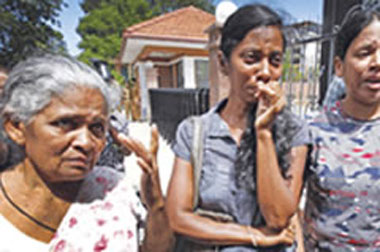|
December 18 was International Migrants Day:
Depressed and anxious
The mental cost of being left behind:
by Dilrukshi Handunnetti
New research on the mental health of family members of migrant
workers 'left behind' in Sri Lanka has shown the high prevalence of
Common Mental Disorders (CMD) in spouses and non-spouse caregivers,
reflecting the flagging mental health among these two categories of
people as a direct result of the economic choices made by family
members.
Sampling and research
|

Chakranews.com |
Data for the survey has been gathered
through a cross-sectional survey of spouses and non-spouse
caregivers from families of economic migrants from six
districts - (Colombo, Gampaha, Kurunegala, Kandy, Kalutara
and Puttalam) - representing 62% of the outbound
international migrant worker population of Sri Lanka.
A total of 410 families have responded to
the survey, including spouse and non-spouse caregivers in 55
families, totalling 277 spouses and 188 caregivers.
The study was supported by the
International Organization of Migration (IOM Sri Lanka) with
input from the Ministry of Health and the Intern Ministerial
Task Force on Migration Health, led by Chesmal Siriwardhana
of the Faculty of Medicine science, Anglia Ruskin
University, UK. |
The research - the first of its kind in Sri Lanka and titled 'Common
mental disorders among adult members of 'left behind' international
migrant worker families in Sri Lanka' explores the mental health
concerns of adult members in families left behind and the mental health
implications of economic migration in general.
High prevalence
The research has highlighted 'considerable high prevalence' of Common
Mental Disorders (CMD) among adults in the left-behind families. These
disorders include depression, somatoform disorder and anxiety.
The data also revealed the overall prevalence of CMD to be 20.7%,
some 14.4% among spouses of and 29. 8 % among non-spouse caregivers. The
prevalence of depression (25.5%) and somatoform disorder (11.7%) was
higher among the non-spouse caregiver group.
Significantly, there is high prevalence of CMD, including depression,
among the adult left-behind family members population, when compared
with the national prevalence levels which stands at CMD (13.8%) and
depression (9.1%)
Also, it brought to light that the non-spouse caregiver group in the
left-behind families showed 'more than double the burden of CMD' and its
constituent disorders than the spouse group.
The research also led to the understanding that CMD among the two
surveyed categories differed: Among the spouses, CMD was associated with
the non-returning of the International Migrant Worker (IWM) in the
family, primary education and low in-bound remittance frequency whereas
for the non-spouse caregiver category, the reasons were low/no
education, poor general health and increased healthcare visits in the
absence of the IWM.
Researchers have drawn the conclusion that despite clear monetary
benefits to individuals, their families and the country itself, that
there is strong evidence to indicate the numerous unfavourable effects
of economic migration, including adverse health outcomes for both IWMs
and their left behind families. The research stated: "Although several
studies have provided insights into the social, legal and economic
impacts of economic migration in Sri Lanka, empirical evidence about the
true scale of nationwide health impact of economic migration is
scarce..... Although sparse, there is some evidence that migration of
adult children for economic reasons can negatively affect both mental
and physical health of ageing parents, there is no existing studies
exploring health status of left-behind spouses or non-spouse caregivers,
who play a role in providing care for children and other members of
left-behind families."
Policy framework
The study also highlighted another important aspect - though less
researched: the negative impacts of economic migration among the
left-behind families.
Statistically, nearly one in ten Sri Lankans employed overseas is
international migrant workers (IMW). Sri Lanka is among the eleven
labour-sending countries with over 805 of migrant workers employed in
the Middle East.
In this backdrop, the researchers have called for a policy framework
that enables health protection while identifying the promotion of
migration for development for Sri Lanka being replete with challenges to
the nation.
Speaking to the Sunday Observer, Foreign Employment promotion and
Welfare Minister, Thalatha Athukorala said that there are multiple
aspects to labour migration that had not been addressed due to the
"natural preoccupation" with labour and safety concerns. "The government
is now looking at some of these concerns which had fallen off the table
and understanding these issues scientifically helps the process."
Meanwhile, Viola Perera of the Action Network for Migrant Workers,
said that Sri Lanka's obsession with a few issues concerning migrant
workers have remained a problem. "There is so much that falls through
the cracks and a national policy on addressing these multiple concerns
is indeed a good idea,' she said. |


